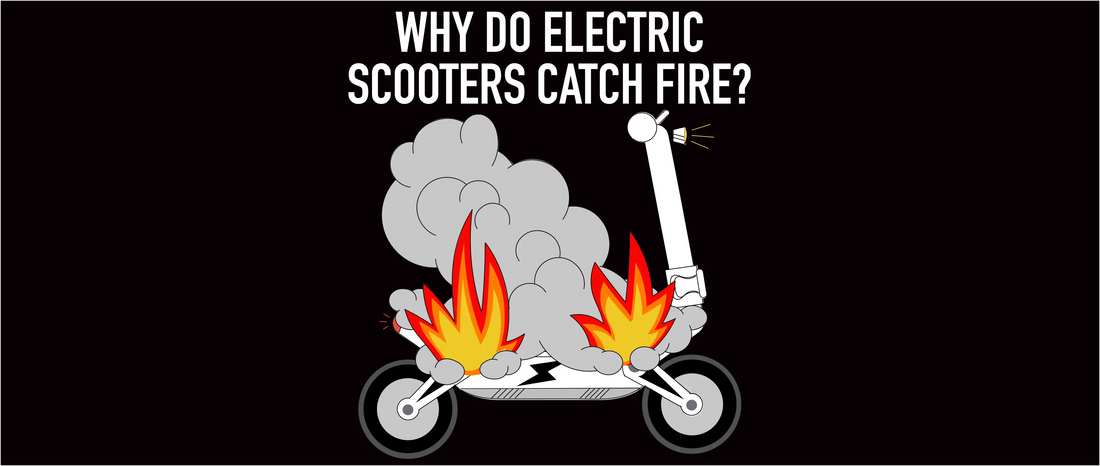
Why Do Electric Scooters Catch Fire?
Share
Over the years, as scooting becomes more popular, there has been an increase of scooter related house fires some of which have taken lives. Unfortunately the media has blown the issue way out of proportion (as they so often do) creating confusion and fear amongst the general public. So what's the story? Should you be concerned if you own a scooter? Lets discuss...

So the problem in a nutshell is Lithium. A highly reactive metal used in the manufacture of new age, light weight batteries (in comparison to lead/acid batteries) that pack a higher voltage into a much smaller space. Without lithium batteries scooters as we know them and indeed all electric vehicles, mobile phones and many other electrical devices wouldn't exist or would be very different.
Battery manufacturers have learned over the years how to package the battery in such a way that it makes them relatively stable under normal conditions. They've also implemented electrical safety systems that act like self resetting circuit breakers. Otherwise known as Battery Management Systems (BMS) these safety circuits "manage" the flow of power in and out of individual cells inside the battery keeping things balanced. In the event of a short the BMS will trigger, stopping the flow of power in or out of the battery.
These systems mean that under normal conditions your battery will work as intended without any risk of fire. However life seldom offers normal conditions.
Ok... so why do we have scooters catching fire? The answer is simple, external factors. I've charged many thousands of scooters over the years and I've done dumb things in my early days like directly shorting main battery wires. I even once watched a customer plug their scooter into charge in order to demonstrate the fact it wasn't charging then later opened it up to discover an inch of water inside. Battery half submerged and charge port at water level. In all of my experience I've never personally seen a battery/scooter catch fire. I have however been involved in several QFS scooter fire related investigations.

In each of these cases the cause came down to external factors. To start with some of them were due to the wrong charger being used. Stolen scooters are commonly sold without a charger and unsuspecting buyers don't have the required knowledge when selecting a replacement charger online. Cheap chargers are downright dangerous, there should be laws against their sale. These chargers have no overload protection and in so many cases put out a different voltage to that stated on the charger. This is why we are told not to leave a charging scooter unattended. The battery simply overcharges which causes a chain reaction that ultimately leads to fire. Even quality chargers can have the same effect if a charger that exceeds the batteries voltage or amperage capabilities is used.
A few went up in flames due to cheap aftermarket replacement batteries being installed. When people import privately there is no checking what you're getting is what you've been promised. They may all look the same on the outside but it's what's inside that counts. I've personally seen a battery pack with a block of wood in the middle, making it appear a bigger size from the outside. This customer couldn't understand why they were getting less range even though they had replaced their battery with one that had "the same specs as factory". Worse still some of these batteries have no safety system at all, just a very basic BMS in order to charge. Believe it or not lithium batteries ARE expensive, you can't escape that fact. There is substantial cost in attainting the raw materials to make them and in all transport situations there is added cost due to being classed as dangerous goods. It all adds cost to the end user and while retailers do add their markup it is negligible in comparison to other parts. When a stock battery is $1000 but you find "the same thing" online for a third of the cost you have to ask yourself why? The old story of if it seems too good to be true it probably is. The same can be said for cheap scooter imports, they are not going to give you product for free. They ARE making a profit. So what corners have been cut to get the price down so far?

Another handful caused by extreme water damage. Water is not any scooters friend, you should not be using your scooter in ANY moist conditions. Even fog has the potential to do damage, usually not to the battery but when a substantial amount gets in the story changes. Water getting into the battery itself has the potential to bypass the BMS rendering the safety systems useless. This is often triggered when the scooter is plugged into charge. Long story short don't get your scooter wet.
Physical damage is another cause. In some cases it's immediate, in others it can go unnoticed for some time before things get heated. Batteries should be secured inside the scooter by glues, tapes and packing foam so there is zero ability for the battery to move. Glues and tapes loose their effectiveness over time and vibration can cause packing foam to move. Couple this with some extreme riding or a crash and you have a recipe for disaster. Another common way batteries are physically damaged is by poor repair practice. Bolts and screws often rattle loose and in some cases fall out completely (just to make friends with the next scooter riders tyres). When replacing missing bolts it is important to use an exact copy of the original. Bolts and screws that are too long have the potential to pierce the battery and cause a very bad day.

And finally (the one that grinds my gears) is DIY battery repairs. In a lot of cases batteries can be repaired rather than replaced BUT not without great risk. There is no number of YouTube videos that can compare to years of hands on experience. Even I myself do not dabble in battery repairs due to the risk for myself as well as my customers and costs of insurance in order to do so. If you choose to go down the repair road I strongly suggest doing your research when selecting a repairer. There are many people who say they can do it but not many of them are insured let alone experienced. These gung ho repairers have zero regard for the well being of their customers with motivations focused solely on profiting. One small mistake could cost a life, it's just not worth the risk. Do not attempt repairs on your own without the experience to do so confidently. I can't stress this strongly enough.

So there we have it, the reasons scooters catch fire. Hopefully this has allayed any fears or questions you had regarding the subject. While I maintain that scooter batteries are completely safe when treated correctly it is still important to follow your local laws regarding scooter charging. Things can and do go wrong and sometimes it can happen despite your best efforts to avoid it. A case of its better to be safe than sorry! My recommendation is (aside from the above) no matter what you're charging, what you're charging it with or in what condition it is in, do so in a safe place. The battery (or in some cases the charger) are the only things that will burn in the event of a major failure. As long as the scooter is away from anything else that can catch fire the damage will be mitigated. Another risk from lithium fires is the gasses that are released during the reaction (it's actually the gasses that burn, not the battery itself). These gasses are toxic and should not be inhaled in any amount. For this reason its important to also consider the ventilation available in the spot you intend to charge your scooter.
 is here! Shop now, pay later in 4 easy installments
is here! Shop now, pay later in 4 easy installments
